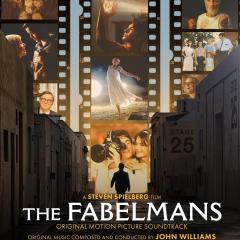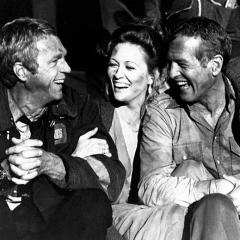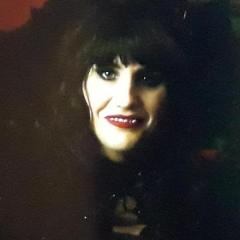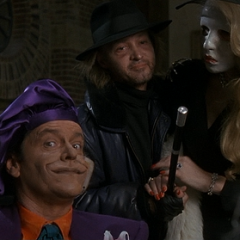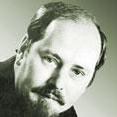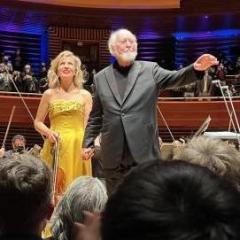
Jediwashington
-
Posts
150 -
Joined
-
Last visited
-
Days Won
2
Reputation Activity
-
 Jediwashington got a reaction from aviazn in Star Wars: The Last Jedi scoring sessions resume in Los Angeles
Jediwashington got a reaction from aviazn in Star Wars: The Last Jedi scoring sessions resume in Los Angeles
Yeah... I would say from doing years of classical music study, this is where about 70% of classical musicians fall. Williams = "Pop-Classical for the masses," not actually innovative writing. Williams is clearly an Opera and Ballet lover, and there are so many similarities in in writing from standard romantic/neo-romantic Operas and Ballets.
It's getting better though, since a lot of musicians these days went into music because of Williams. That and management as well as the musicians are starting to realize the value in his music for selling out strict large-orchestra instrumental music while not having to invite some incredibly expensive soloist or bring in vocalists. The cost is already built into the union contract and you might just have to pay some doubling fees and bring in some ringers to give the brass some body and pay a second principal trumpet to give the lead a break.
-
 Jediwashington got a reaction from Smeltington in JoAnn Kane's Mark Graham Interview on orchestrating for Williams
Jediwashington got a reaction from Smeltington in JoAnn Kane's Mark Graham Interview on orchestrating for Williams
Depends on the workflow. Williams needed copyists with some ability to fill in details more than he needed orchestrators. He is really familiar with ranges, tone colors, and blend, no doubt from all his years on a podium as well. There are tons of composers who don't know that level of detail, and thus need someone to flesh out their ideas more clearly, or they work in a team environment where they do more signing off of material than actually writing it and call those people "orchestrators."
Orchestration and Copyists have been a dying art form anyway. It was sort of the middle man built by the pace required in Hollywood. Finale is so quick now, most competent composers don't need much help. Finale even indicates now when a note is out of range for a particular instrument while you are writing. The biggest annoyance is formatting the parts for page turns, anything that might overlap accidentally, and printing. For that JoAnn Kane is a blessing, as most printers have NO clue how to do music.
-
 Jediwashington got a reaction from Will in JoAnn Kane's Mark Graham Interview on orchestrating for Williams
Jediwashington got a reaction from Will in JoAnn Kane's Mark Graham Interview on orchestrating for Williams
Depends on the workflow. Williams needed copyists with some ability to fill in details more than he needed orchestrators. He is really familiar with ranges, tone colors, and blend, no doubt from all his years on a podium as well. There are tons of composers who don't know that level of detail, and thus need someone to flesh out their ideas more clearly, or they work in a team environment where they do more signing off of material than actually writing it and call those people "orchestrators."
Orchestration and Copyists have been a dying art form anyway. It was sort of the middle man built by the pace required in Hollywood. Finale is so quick now, most competent composers don't need much help. Finale even indicates now when a note is out of range for a particular instrument while you are writing. The biggest annoyance is formatting the parts for page turns, anything that might overlap accidentally, and printing. For that JoAnn Kane is a blessing, as most printers have NO clue how to do music.
-
 Jediwashington got a reaction from MikeH in JoAnn Kane's Mark Graham Interview on orchestrating for Williams
Jediwashington got a reaction from MikeH in JoAnn Kane's Mark Graham Interview on orchestrating for Williams
http://www.finalemusic.com/blog/may-the-fourth-spotlight-on-joann-kane-music/
Interview with Mark Graham from Joann Kane was posted today in honor of May the 4th. He talks a lot about how Williams orchestration process has changed, and a fun anecdote about a Harry Potter cue that Williams forgot to write in on a sketch that he needed string parts for:
Sound's like Knight Bus? Any other ideas?
Tons of little tid-bits for discussion, so I thought I would start a thread.
-
 Jediwashington got a reaction from Marc in JoAnn Kane's Mark Graham Interview on orchestrating for Williams
Jediwashington got a reaction from Marc in JoAnn Kane's Mark Graham Interview on orchestrating for Williams
http://www.finalemusic.com/blog/may-the-fourth-spotlight-on-joann-kane-music/
Interview with Mark Graham from Joann Kane was posted today in honor of May the 4th. He talks a lot about how Williams orchestration process has changed, and a fun anecdote about a Harry Potter cue that Williams forgot to write in on a sketch that he needed string parts for:
Sound's like Knight Bus? Any other ideas?
Tons of little tid-bits for discussion, so I thought I would start a thread.
-
 Jediwashington got a reaction from justaguy in JoAnn Kane's Mark Graham Interview on orchestrating for Williams
Jediwashington got a reaction from justaguy in JoAnn Kane's Mark Graham Interview on orchestrating for Williams
http://www.finalemusic.com/blog/may-the-fourth-spotlight-on-joann-kane-music/
Interview with Mark Graham from Joann Kane was posted today in honor of May the 4th. He talks a lot about how Williams orchestration process has changed, and a fun anecdote about a Harry Potter cue that Williams forgot to write in on a sketch that he needed string parts for:
Sound's like Knight Bus? Any other ideas?
Tons of little tid-bits for discussion, so I thought I would start a thread.
-
 Jediwashington got a reaction from Will in Star Wars: The Last Jedi scoring sessions resume in Los Angeles
Jediwashington got a reaction from Will in Star Wars: The Last Jedi scoring sessions resume in Los Angeles
Yeah... I would say from doing years of classical music study, this is where about 70% of classical musicians fall. Williams = "Pop-Classical for the masses," not actually innovative writing. Williams is clearly an Opera and Ballet lover, and there are so many similarities in in writing from standard romantic/neo-romantic Operas and Ballets.
It's getting better though, since a lot of musicians these days went into music because of Williams. That and management as well as the musicians are starting to realize the value in his music for selling out strict large-orchestra instrumental music while not having to invite some incredibly expensive soloist or bring in vocalists. The cost is already built into the union contract and you might just have to pay some doubling fees and bring in some ringers to give the brass some body and pay a second principal trumpet to give the lead a break.
-
 Jediwashington got a reaction from Will in JoAnn Kane's Mark Graham Interview on orchestrating for Williams
Jediwashington got a reaction from Will in JoAnn Kane's Mark Graham Interview on orchestrating for Williams
http://www.finalemusic.com/blog/may-the-fourth-spotlight-on-joann-kane-music/
Interview with Mark Graham from Joann Kane was posted today in honor of May the 4th. He talks a lot about how Williams orchestration process has changed, and a fun anecdote about a Harry Potter cue that Williams forgot to write in on a sketch that he needed string parts for:
Sound's like Knight Bus? Any other ideas?
Tons of little tid-bits for discussion, so I thought I would start a thread.
-
 Jediwashington reacted to aviazn in Star Wars: The Last Jedi scoring sessions resume in Los Angeles
Jediwashington reacted to aviazn in Star Wars: The Last Jedi scoring sessions resume in Los Angeles
It may never have hit some of them. True story (as best I can recall it):
When I was in high school, I went to Germany on an exchange program with a school in the town of Sigmaringen. One day, my exchange partner—who was as big a fan of Star Wars as I was—invited me to come along with him to his youth orchestra rehearsal after school. The reason I might be interested, he told me, was that their music director had played some brass instrument on some of the original Star Wars sessions with the LSO. "Ah yes, the old war stories," his dad snorted. "Always going on about his Star Wars glory days."
But that sounded terrific to me, so I went, and sat through their entirely unremarkable rehearsal of school band arrangements of some classical standards and The Lion King, and when it was over I went up to the director (whose name I've long since forgotten) and asked him if it was true, if he'd really played on the Star Wars sessions. Yes, he said—he'd been a university student in London 1977, and his teacher was an LSO member. Since Williams asked for double brass, several of the players brought their students.
Wide-eyed, I followed-up, "And did you guys know then how big the score was going to be?"
He sneered and said, "Nah, we had no idea because it was nothing original. It was just second-rate neoromantic rip-offs. Nobody thought it was going to be anything. You want to know what was really special? A few weeks later, I sat in on another session at Abbey Road…" and he proceeded to tell me about a jazz ensemble that recorded a tremendously innovative record (whose name now escapes me), full of bold lines and unconventional time signatures. I nodded along, trying to hide how crestfallen I was, and never got another word out of him about Star Wars.
As disappointed as 18-year-old me was, on its face, his recollection of the orchestra's reaction seemed plausible. Of course, it's entirely possible the guy is just a pretentious hater. Nevertheless, it always makes me think twice whenever I hear LSO players talking about how incredible it was to play on those sessions, and wonder how much of those glowing recollections are enhanced by time, and whether at the time they really thought anything much of John Williams at all.
And also, I wish I'd remembered the name of that jazz group.
-
 Jediwashington got a reaction from leeallen01 in John Williams is untouchable
Jediwashington got a reaction from leeallen01 in John Williams is untouchable
Williams is a modern day Gershwin that took progressive jazz and standards writing and dressed it up for orchestra. I'm constantly amazed at his depth of compositional language from a chordal stand point and the areas he explores. It's much easier to analyze his works from a jazz perspective than from a traditional theory. He uses keys to influence mood unlike any other composer for film. It's quite clear he has a deep love of ballet, opera, and tone poems. His awareness of the standard rep and even the more esoteric material has certainly informed his orchestrations and given him this incredible paintbrush to use for every film he works on. From a music stand point, it's his timbre and tone colors that make his style so unique.
As well, his ear is impeccable as a conductor. I have never regarded him as a good conductor (and I have no doubt that was part of the reason Boston and him had some trouble at one point) but he has great ears from the podium and no one can create as clean a take as he can so quickly. He does have the best playing for him, but that is only part of the equation.
But by far my favorite thing about Williams is his humility and somewhat self loathing quality. He writes what he thinks is needed for the film and never boasts that his work is any good. He simply enjoys the journey of writing, refuses to let the strict classical community get to him, and continues to explore his own voice while staying true to the core of his style, even at this age. His work ethic is incredible as well and given his personality and love for writing, I have no doubt that some of his best works and sketches will be discovered in a filing cabinet labeled "little nothing works."
It's sad that I really don't see anyone as complete of a musician as him coming up through film. He has been blessed to have a name that allowed him to blow holes through most fast pace production environments and consider the music as a complete package that needed time, but the younger folks don't have this liberty. It's probably the true reason he doesn't work with any young directors aside from the price.
Overall, I think his work will be looked upon for centuries as the culmination of the symphonic film score era. I hope someone close to him can encourage him at this age to take on a protege to learn some of his shortcuts, discussions with directors during spotting, and learn some more detailed insight to the process so we can continue truly symphonic scores that actually match film moving forward.
-
 Jediwashington got a reaction from Pieter Boelen in John Williams is untouchable
Jediwashington got a reaction from Pieter Boelen in John Williams is untouchable
Williams is a modern day Gershwin that took progressive jazz and standards writing and dressed it up for orchestra. I'm constantly amazed at his depth of compositional language from a chordal stand point and the areas he explores. It's much easier to analyze his works from a jazz perspective than from a traditional theory. He uses keys to influence mood unlike any other composer for film. It's quite clear he has a deep love of ballet, opera, and tone poems. His awareness of the standard rep and even the more esoteric material has certainly informed his orchestrations and given him this incredible paintbrush to use for every film he works on. From a music stand point, it's his timbre and tone colors that make his style so unique.
As well, his ear is impeccable as a conductor. I have never regarded him as a good conductor (and I have no doubt that was part of the reason Boston and him had some trouble at one point) but he has great ears from the podium and no one can create as clean a take as he can so quickly. He does have the best playing for him, but that is only part of the equation.
But by far my favorite thing about Williams is his humility and somewhat self loathing quality. He writes what he thinks is needed for the film and never boasts that his work is any good. He simply enjoys the journey of writing, refuses to let the strict classical community get to him, and continues to explore his own voice while staying true to the core of his style, even at this age. His work ethic is incredible as well and given his personality and love for writing, I have no doubt that some of his best works and sketches will be discovered in a filing cabinet labeled "little nothing works."
It's sad that I really don't see anyone as complete of a musician as him coming up through film. He has been blessed to have a name that allowed him to blow holes through most fast pace production environments and consider the music as a complete package that needed time, but the younger folks don't have this liberty. It's probably the true reason he doesn't work with any young directors aside from the price.
Overall, I think his work will be looked upon for centuries as the culmination of the symphonic film score era. I hope someone close to him can encourage him at this age to take on a protege to learn some of his shortcuts, discussions with directors during spotting, and learn some more detailed insight to the process so we can continue truly symphonic scores that actually match film moving forward.
-
 Jediwashington got a reaction from Will in John Williams is untouchable
Jediwashington got a reaction from Will in John Williams is untouchable
Williams is a modern day Gershwin that took progressive jazz and standards writing and dressed it up for orchestra. I'm constantly amazed at his depth of compositional language from a chordal stand point and the areas he explores. It's much easier to analyze his works from a jazz perspective than from a traditional theory. He uses keys to influence mood unlike any other composer for film. It's quite clear he has a deep love of ballet, opera, and tone poems. His awareness of the standard rep and even the more esoteric material has certainly informed his orchestrations and given him this incredible paintbrush to use for every film he works on. From a music stand point, it's his timbre and tone colors that make his style so unique.
As well, his ear is impeccable as a conductor. I have never regarded him as a good conductor (and I have no doubt that was part of the reason Boston and him had some trouble at one point) but he has great ears from the podium and no one can create as clean a take as he can so quickly. He does have the best playing for him, but that is only part of the equation.
But by far my favorite thing about Williams is his humility and somewhat self loathing quality. He writes what he thinks is needed for the film and never boasts that his work is any good. He simply enjoys the journey of writing, refuses to let the strict classical community get to him, and continues to explore his own voice while staying true to the core of his style, even at this age. His work ethic is incredible as well and given his personality and love for writing, I have no doubt that some of his best works and sketches will be discovered in a filing cabinet labeled "little nothing works."
It's sad that I really don't see anyone as complete of a musician as him coming up through film. He has been blessed to have a name that allowed him to blow holes through most fast pace production environments and consider the music as a complete package that needed time, but the younger folks don't have this liberty. It's probably the true reason he doesn't work with any young directors aside from the price.
Overall, I think his work will be looked upon for centuries as the culmination of the symphonic film score era. I hope someone close to him can encourage him at this age to take on a protege to learn some of his shortcuts, discussions with directors during spotting, and learn some more detailed insight to the process so we can continue truly symphonic scores that actually match film moving forward.
-
 Jediwashington got a reaction from Gruesome Son of a Bitch in John Williams is untouchable
Jediwashington got a reaction from Gruesome Son of a Bitch in John Williams is untouchable
Williams is a modern day Gershwin that took progressive jazz and standards writing and dressed it up for orchestra. I'm constantly amazed at his depth of compositional language from a chordal stand point and the areas he explores. It's much easier to analyze his works from a jazz perspective than from a traditional theory. He uses keys to influence mood unlike any other composer for film. It's quite clear he has a deep love of ballet, opera, and tone poems. His awareness of the standard rep and even the more esoteric material has certainly informed his orchestrations and given him this incredible paintbrush to use for every film he works on. From a music stand point, it's his timbre and tone colors that make his style so unique.
As well, his ear is impeccable as a conductor. I have never regarded him as a good conductor (and I have no doubt that was part of the reason Boston and him had some trouble at one point) but he has great ears from the podium and no one can create as clean a take as he can so quickly. He does have the best playing for him, but that is only part of the equation.
But by far my favorite thing about Williams is his humility and somewhat self loathing quality. He writes what he thinks is needed for the film and never boasts that his work is any good. He simply enjoys the journey of writing, refuses to let the strict classical community get to him, and continues to explore his own voice while staying true to the core of his style, even at this age. His work ethic is incredible as well and given his personality and love for writing, I have no doubt that some of his best works and sketches will be discovered in a filing cabinet labeled "little nothing works."
It's sad that I really don't see anyone as complete of a musician as him coming up through film. He has been blessed to have a name that allowed him to blow holes through most fast pace production environments and consider the music as a complete package that needed time, but the younger folks don't have this liberty. It's probably the true reason he doesn't work with any young directors aside from the price.
Overall, I think his work will be looked upon for centuries as the culmination of the symphonic film score era. I hope someone close to him can encourage him at this age to take on a protege to learn some of his shortcuts, discussions with directors during spotting, and learn some more detailed insight to the process so we can continue truly symphonic scores that actually match film moving forward.
-
 Jediwashington got a reaction from Loert in John Williams is untouchable
Jediwashington got a reaction from Loert in John Williams is untouchable
Williams is a modern day Gershwin that took progressive jazz and standards writing and dressed it up for orchestra. I'm constantly amazed at his depth of compositional language from a chordal stand point and the areas he explores. It's much easier to analyze his works from a jazz perspective than from a traditional theory. He uses keys to influence mood unlike any other composer for film. It's quite clear he has a deep love of ballet, opera, and tone poems. His awareness of the standard rep and even the more esoteric material has certainly informed his orchestrations and given him this incredible paintbrush to use for every film he works on. From a music stand point, it's his timbre and tone colors that make his style so unique.
As well, his ear is impeccable as a conductor. I have never regarded him as a good conductor (and I have no doubt that was part of the reason Boston and him had some trouble at one point) but he has great ears from the podium and no one can create as clean a take as he can so quickly. He does have the best playing for him, but that is only part of the equation.
But by far my favorite thing about Williams is his humility and somewhat self loathing quality. He writes what he thinks is needed for the film and never boasts that his work is any good. He simply enjoys the journey of writing, refuses to let the strict classical community get to him, and continues to explore his own voice while staying true to the core of his style, even at this age. His work ethic is incredible as well and given his personality and love for writing, I have no doubt that some of his best works and sketches will be discovered in a filing cabinet labeled "little nothing works."
It's sad that I really don't see anyone as complete of a musician as him coming up through film. He has been blessed to have a name that allowed him to blow holes through most fast pace production environments and consider the music as a complete package that needed time, but the younger folks don't have this liberty. It's probably the true reason he doesn't work with any young directors aside from the price.
Overall, I think his work will be looked upon for centuries as the culmination of the symphonic film score era. I hope someone close to him can encourage him at this age to take on a protege to learn some of his shortcuts, discussions with directors during spotting, and learn some more detailed insight to the process so we can continue truly symphonic scores that actually match film moving forward.
-
 Jediwashington got a reaction from Taikomochi in John Williams is untouchable
Jediwashington got a reaction from Taikomochi in John Williams is untouchable
Williams is a modern day Gershwin that took progressive jazz and standards writing and dressed it up for orchestra. I'm constantly amazed at his depth of compositional language from a chordal stand point and the areas he explores. It's much easier to analyze his works from a jazz perspective than from a traditional theory. He uses keys to influence mood unlike any other composer for film. It's quite clear he has a deep love of ballet, opera, and tone poems. His awareness of the standard rep and even the more esoteric material has certainly informed his orchestrations and given him this incredible paintbrush to use for every film he works on. From a music stand point, it's his timbre and tone colors that make his style so unique.
As well, his ear is impeccable as a conductor. I have never regarded him as a good conductor (and I have no doubt that was part of the reason Boston and him had some trouble at one point) but he has great ears from the podium and no one can create as clean a take as he can so quickly. He does have the best playing for him, but that is only part of the equation.
But by far my favorite thing about Williams is his humility and somewhat self loathing quality. He writes what he thinks is needed for the film and never boasts that his work is any good. He simply enjoys the journey of writing, refuses to let the strict classical community get to him, and continues to explore his own voice while staying true to the core of his style, even at this age. His work ethic is incredible as well and given his personality and love for writing, I have no doubt that some of his best works and sketches will be discovered in a filing cabinet labeled "little nothing works."
It's sad that I really don't see anyone as complete of a musician as him coming up through film. He has been blessed to have a name that allowed him to blow holes through most fast pace production environments and consider the music as a complete package that needed time, but the younger folks don't have this liberty. It's probably the true reason he doesn't work with any young directors aside from the price.
Overall, I think his work will be looked upon for centuries as the culmination of the symphonic film score era. I hope someone close to him can encourage him at this age to take on a protege to learn some of his shortcuts, discussions with directors during spotting, and learn some more detailed insight to the process so we can continue truly symphonic scores that actually match film moving forward.
-
 Jediwashington reacted to Muad'Dib in Anyone Else Have Nerdy JW Traditions?
Jediwashington reacted to Muad'Dib in Anyone Else Have Nerdy JW Traditions?
When I'm drunk I sing Haddock's theme.
-
 Jediwashington reacted to Jilal in Earliest JW Sketch?
Jediwashington reacted to Jilal in Earliest JW Sketch?
An interesting thing to note is that his handwriting hasn't changed a bit since then.
-

-
 Jediwashington reacted to karelm in THE BFG OST ALBUM Discussion
Jediwashington reacted to karelm in THE BFG OST ALBUM Discussion
I think Sophie's Future and The Queen's Dream would make a nice concert suite...that or just Sophie and the BFG.
This part from Frolic:
Reminds me of Bartok:
There is really alot of very beautiful music in this score...too bad the film is so full of Spielberg in grandfather mediocrity mode.
-
 Jediwashington reacted to karelm in THE BFG OST ALBUM Discussion
Jediwashington reacted to karelm in THE BFG OST ALBUM Discussion
Interestingly, a lot of us find this score to be JW going in a playful and impressionistic new direction.
-
 Jediwashington reacted to EdwardHall in THE BFG OST ALBUM Discussion
Jediwashington reacted to EdwardHall in THE BFG OST ALBUM Discussion
Absolutely, that was my experience as well.
-
 Jediwashington reacted to Incanus in THE BFG OST ALBUM Discussion
Jediwashington reacted to Incanus in THE BFG OST ALBUM Discussion
This is the quality I usually call "allusion" in Williams' work, where he may adopt certain sound but usually it doesn't involve pure pastiche or regurgitation or outright copying but referencing the stylistic parameters or colours of the given style or genre. He can write Copland-esque Americana to achieve a certain effect, quote the feel of the 1940's film noir without resorting to copying or adapt to more avant garde approach with equal ease and naturally it all goes through his persona and experience as a person and a composer to give it his distinct stamp.
-
 Jediwashington reacted to Jay in THE BFG OST ALBUM Discussion
Jediwashington reacted to Jay in THE BFG OST ALBUM Discussion
I certainly liked it more once I saw the film
-
 Jediwashington reacted to #SnowyVernalSpringsEternal in Did anyone notice this in the iTunes Store?
Jediwashington reacted to #SnowyVernalSpringsEternal in Did anyone notice this in the iTunes Store?
At last you are learning
-
 Jediwashington reacted to #SnowyVernalSpringsEternal in Did anyone notice this in the iTunes Store?
Jediwashington reacted to #SnowyVernalSpringsEternal in Did anyone notice this in the iTunes Store?
No, a response to Richards question. I'm surprised that is unclear to you. Are things ok?

